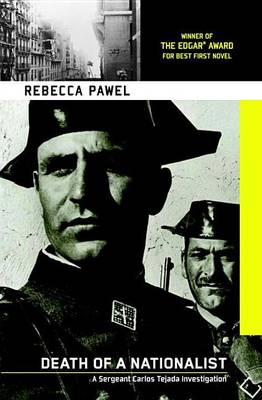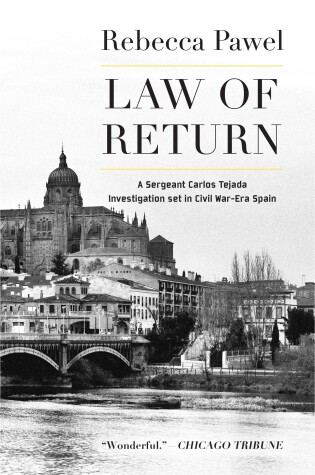Sergeant Carlos Tejada Investigation
3 primary works
Book 1
Madrid 1939. Carlos Tejada Alonso y León is a Sergeant in the Guardia Civil, a rank rare for a man not yet thirty, but Tejada is an unusual recruit. The bitter civil war between the Nationalists and the Republicans has interrupted his legal studies in Salamanca. Second son of a conservative Southern family of landowners, he is an enthusiast for the Catholic Franquista cause, a dedicated, and now triumphant, Nationalist.
This war has drawn international attention. In a dress rehearsal for World War II, fascists support the Nationalists, while communists have come to the aid of the Republicans. Atrocities have devastated both sides. It is at this moment, when the Republicans have surrendered, and the Guardia Civil has begun to impose order in the ruins of Madrid, that Tejada finds the body of his best friend, a hero of the siege of Toledo, shot to death on a street named Amor de Dios. Naturally, a Red is suspected. And it is easy for Tejada to assume that the woman caught kneeling over the body is the killer. But when his doubts are aroused, he cannot help seeking justice.
This war has drawn international attention. In a dress rehearsal for World War II, fascists support the Nationalists, while communists have come to the aid of the Republicans. Atrocities have devastated both sides. It is at this moment, when the Republicans have surrendered, and the Guardia Civil has begun to impose order in the ruins of Madrid, that Tejada finds the body of his best friend, a hero of the siege of Toledo, shot to death on a street named Amor de Dios. Naturally, a Red is suspected. And it is easy for Tejada to assume that the woman caught kneeling over the body is the killer. But when his doubts are aroused, he cannot help seeking justice.
Book 2
The second Carlos Tejada investigation
Spain, 1940: Lieutenant Carlos Tejada has been transferred to Salamanca, where he studied law before the Civil War. His new duties include monitoring parolees—former professors who were fired for protesting a Franco decree. Elena Fernandez, having lost her job because of her political leanings, has returned home to Salamanca from Madrid, where she and Tejada were first romantically involved. Her father, one of the parolees, was a distinguished professor of Classics. He has just received a letter from a Jewish friend, Professor Joseph Meyer, begging for help to cross into Spain from France before he is forcibly repatriated to Germany. Professor Fernandez cannot violate his parole by traveling to the border town of San Sebastian, so Elena goes in his stead. Tejada, tracing a missing parolee, also finds himself there, and their paths fatefully cross again.
Spain, 1940: Lieutenant Carlos Tejada has been transferred to Salamanca, where he studied law before the Civil War. His new duties include monitoring parolees—former professors who were fired for protesting a Franco decree. Elena Fernandez, having lost her job because of her political leanings, has returned home to Salamanca from Madrid, where she and Tejada were first romantically involved. Her father, one of the parolees, was a distinguished professor of Classics. He has just received a letter from a Jewish friend, Professor Joseph Meyer, begging for help to cross into Spain from France before he is forcibly repatriated to Germany. Professor Fernandez cannot violate his parole by traveling to the border town of San Sebastian, so Elena goes in his stead. Tejada, tracing a missing parolee, also finds himself there, and their paths fatefully cross again.
Book 3
The third Carlos Tejada investigation
Spain, 1940: Potes, a remote northern mountain village, is Carlos Tejada’s first independent Guardia Civil command. He soon discovers that this “promotion” is a mixed blessing. The villagers are unwelcoming. He and his pregnant wife, Elena, have no place to live but the jail, and his own men seem strangely hostile. Is it just their suspicion of his wife’s Republican sympathies? Or is there more going on in the beautiful but bleak area, recently devastated by the civil war? Tejada discovers that there may, indeed, be a new outbreak of that war with Potes as its epicenter. And he must find a way to reconcile his love for his wife with his duty.
Spain, 1940: Potes, a remote northern mountain village, is Carlos Tejada’s first independent Guardia Civil command. He soon discovers that this “promotion” is a mixed blessing. The villagers are unwelcoming. He and his pregnant wife, Elena, have no place to live but the jail, and his own men seem strangely hostile. Is it just their suspicion of his wife’s Republican sympathies? Or is there more going on in the beautiful but bleak area, recently devastated by the civil war? Tejada discovers that there may, indeed, be a new outbreak of that war with Potes as its epicenter. And he must find a way to reconcile his love for his wife with his duty.


